There is both praise and concern in Europe over plans for a new fund to cover transport, energy and telecoms infrastructure projects.
February 28, 2012
Read time: 2 mins
There is both praise and concern in Europe over plans for a new fund to cover transport, energy and telecoms infrastructure projects. Certain regions have expressed alarm at the infrastructure fund, saying that it could sideline work currently being approved by national authorities. Talks for this new infrastructure fund have been held in Brussels. However, the EU's Commission for Regional Policy has stated that the fund would not draw from existing regional funding.
The aim of the new fund is to pay trans-European transport (TEN-T) projects, as well as energy and telecommunications. The budget for this fund for the 2014-2020 time-frame could be as high as some ?16 billion. Some regions have expressed concern that the fund could mean a loss of influence for regional governments in the use of EU funds. "We are pleased that the Commission has finally proposed a coherent framework for financing the EU's most badly needed infrastructure projects," said Luisa Todini, president of the6164 European Construction Industry Federation (FIEC) reacting to the unveiling by the Commission of the next EU multi-annual financial framework. Todini gave her support for the proposed "Connecting Europe" facility and spelled out clearly that the construction industry will, ".fight to safeguard the proposed amount of €40 billion," in coming negotiations between the European Parliament and Council. "Thanks to this ad-hoc Facility, €31.6 billion will be dedicated to transport infrastructure alone", explained Todini, "and in addition to this, about €24 billion should further come from the Cohesion Fund. Altogether, this means that a minimum of €55 billion should be dedicated to transport infrastructure over the period 2014-2020, that is, more than the €50 billion available under the current financial framework." Furthermore, FIEC considers that the promotion of EU project bonds through this Facility is also encouraging.
"However, in spite of the support which we can expect from the European Parliament, we are a bit worried about the outcome of the negotiations which are starting now", Todini cautioned. "For the last multi-annual financial framework, the Commission proposed €22 billion to finance the Trans-European Transport Network, but we ended up with only €8 billion." "According to the Commission, it is estimated that about €200 billion is needed to complete the trans-European energy networks, €540 billion needs to be invested in the trans-European transport network, and over €250 billion in ICT over the 2014-2020 period," Todini added.
The aim of the new fund is to pay trans-European transport (TEN-T) projects, as well as energy and telecommunications. The budget for this fund for the 2014-2020 time-frame could be as high as some ?16 billion. Some regions have expressed concern that the fund could mean a loss of influence for regional governments in the use of EU funds. "We are pleased that the Commission has finally proposed a coherent framework for financing the EU's most badly needed infrastructure projects," said Luisa Todini, president of the
"However, in spite of the support which we can expect from the European Parliament, we are a bit worried about the outcome of the negotiations which are starting now", Todini cautioned. "For the last multi-annual financial framework, the Commission proposed €22 billion to finance the Trans-European Transport Network, but we ended up with only €8 billion." "According to the Commission, it is estimated that about €200 billion is needed to complete the trans-European energy networks, €540 billion needs to be invested in the trans-European transport network, and over €250 billion in ICT over the 2014-2020 period," Todini added.






